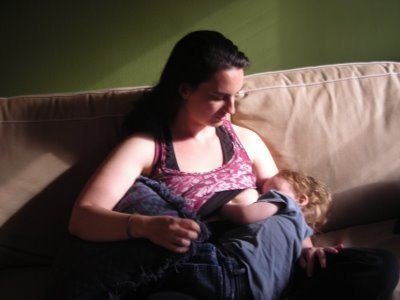by Wendy Wisner, IBCLC
Most of us are comfortable with the idea of nursing an infant. Certainly everyone agrees that breastmilk is the superior infant food. And most people understand that an infant suckling at a mother’s breast is natural (though far too many people are uncomfortable with actually seeing a mother breastfeed!).
There is a lovely, ever-growing subset of people who are comfortable with toddlers nursing. Even in the eight years since my first child was born, nursing a toddler has become more and more accepted. We know that toddlers need “milk” and that breastmilk so neatly fills this need (after all, it was the original “milk” for humans before they drank milk from other species).
It’s the moms who nurse children who are most stigmatized. I haven’t even read all the comments on this article that is going around, but I’ve read enough to recognize the extreme reactions people have when they see a nursing six-year-old.
And you may be one of those people. Most people are. But hold on just a second. I’m not here to criticize you, or even to try to convince you of anything.
I want you to know that I get it. I get the idea that a child—a lanky, chatty, independent child, who is on the course to be a big child—seems too old be breastfeeding.
I once thought that too. I thought that because it was all I’d ever known. It was what I’d been told all my life.
It might mean nothing to you, but did you know that all of this—every notion you’ve ever had about bigger children nursing—is specific to the time we live in, and is completely culturally defined? Did you know that for most of human history, and in many parts of the world still, nursing through early childhood is normal? Did you know we are the anomaly?
Did you know that it is a relatively new thing—and certainly a culturally specific thing—to sexualize breasts to the extent that we do? To sexualize them to the point where any child who can walk or talk is “too old” to be still be nursing because (let’s just come out and say it) there might be something sexual brewing between a mother and her child at that age.
There is nothing sexual about a mother nursing a 4, 5, 6, or 7 year old child. Truly. It’s not a sexual act. It’s an act of nurture. And although breastmilk is not a main source of nutrition for these children, breastmilk contains antibodies and antiviral agents for the entire time a child nurses. We all know that children’s immune systems aren’t as strong as adults’—maybe that’s part of the reason children so often have the need to nurse past infancy and toddlerhood.
According to the anthropologist Kathy Dettwyler, most children wean on their own sometime between the age of 2.5 and 7 years old. These numbers are true to what I’ve observed working with breastfeeding mothers for the past five years. There is a lot of variation here because all kids are different, and reach developmental milestones at different ages.
You can read this article by Dettwyler if you wish, which describes the cultural and biological imperatives behind natural weaning. You may find it illuminating.
You may also think it’s irrelevant—that this is a modern world, and we shouldn’t be beholden to ancient history, and primate biology.
OK. I understand where you’re coming from. But here’s the thing. There are many kids out there nursing—not just the ones in this newest article, or the kid who was on the cover of Time Magazine a few years ago. They might even live down the street from you. They go to school (no, they don’t nurse at school!), soccer practice, art class, etc.
They are normal kids. And they grow up to be successful, flawed, happy, unhappy, thriving, imperfect, awesome adults. Their moms are normal too. They love their kids, they yell sometimes, they apologize, they are tired, trying to figure it out each day.
Here’s how nursing a child works. At the end of the day, when you might cozy up with your young child in bed and snuggle—when your child might reach for a thumb to suckle, or the frayed end of a blanket to cuddle with or suck on—these children might nurse a bit. Usually not much, once they are four years old or so. Most older children nurse briefly, once or twice a day. They will often go days or weeks or months without nursing. That’s how weaning of older children usually happens.
Why do they still nurse? It’s biology, baby. The sucking reflex that we all know babies have doesn’t go away in babyhood or toddlerhood. Like every developmental milestone, it is reached at different times for different kids, but usually diminishes sometime after about 3 years old, and is almost always gone by 6 or 7 years old.
And though some older children might meet their sucking needs by sucking thumbs or binkies or blankets, nursing was the way nature designed for children to meet these needs (without wrecking the alignment of their teeth, by the way).
I’ll tell you a story. My story. I didn’t plan on nursing my son for as long as he did. He was a high-needs baby who always sighed a deep sigh of relief when he latched on and nursed. Even as a young baby he taught me that milk was only a fraction of the reason he nursed. When he was a bouncy, talkative, volatile, emotional toddler, nursing centered him, calmed him, slowed down his body and his breathing. It brought him back to my arms, when he needed a break from constantly jumping and talking (the kid never stopped talking!).
The suckling itself released calming hormones in both of us (biology is cool like that, offering moms and their children lots of incentives to nurse). His instinct to nurse, and my instinct to nurse him, continued for several years. It tapered off just as his body grew, and his jaw-line lengthened, and his big teeth pushed themselves into place behind the milk teeth (there’s a reason they call them milk teeth).
Soon the three-year-old who needed to nurse every few hours became the four-year-old who needed to nurse just at bedtime and in the morning. Then just at bedtime. Then just some days at bedtime. Then his body needed to do different things. He needed to talk himself to sleep. He needed to rest his head against my chest rather than nurse. He needed to hold my hand. He needed to roll into his own bed without me.
All of these changes took time. His time. Our time.
He was my child. I was his mom. If you had told me when he was born that I would be nursing him that long, I would have laughed. But we grew into it together, and out of it too.
You can’t really know until you’ve done it, or you’ve seen it. But it’s normal. The media has sensationalized it, and sexualized it. But it is none of those things. It’s an exchange of love between a mother and child. That’s all.
My two-year-old summed it up perfectly the other day. He lifted my shirt, looked inside, and said, “This is my home.” And I know it will continue to be his home for some time still.
You don’t have to nurse your child for as long I did, or as long as other mothers do. I know you find ways to meet your child’s need for security, for touch, and for love. I am not better than you, and you are not better than me. But I ask you to think outside the box when it comes to mothers nursing their children past a certain age, past the age you feel comfortable with.
And if you are nursing a child past the toddler years, know that you are not alone, there are many of us out there, going with our instincts, and letting our children lead the way.
Nursing my son. He was about 3 at the time. By 4, he wasn’t really nursing much during the day, so I don’t have any pictures of him nursing then!
 Wendy Wisner is a mom, writer, and lactation consultant (IBCLC) in private practice. Her poems, reviews, and essays have appeared in such publications as Prairie Schooner,Brain, Child Magazine, Literary Mama, Mamalode, The Spoon River Review, Natural Child Magazine, Lilith, The Badass Breastfeeder, The Bellevue Literary Review, Scary Mommy, Natural Bridge, and Verse Daily. She blogs at www.nursememama.com. Follow her on Facebook and Twitter.
Wendy Wisner is a mom, writer, and lactation consultant (IBCLC) in private practice. Her poems, reviews, and essays have appeared in such publications as Prairie Schooner,Brain, Child Magazine, Literary Mama, Mamalode, The Spoon River Review, Natural Child Magazine, Lilith, The Badass Breastfeeder, The Bellevue Literary Review, Scary Mommy, Natural Bridge, and Verse Daily. She blogs at www.nursememama.com. Follow her on Facebook and Twitter.













